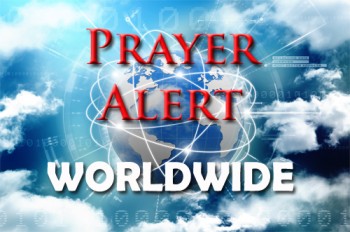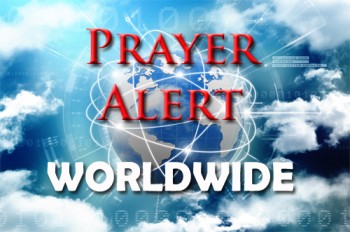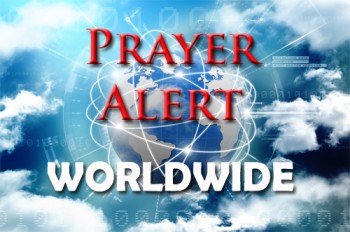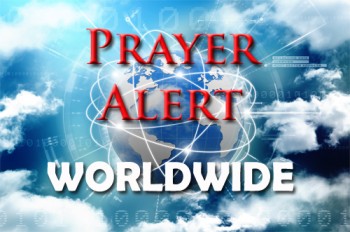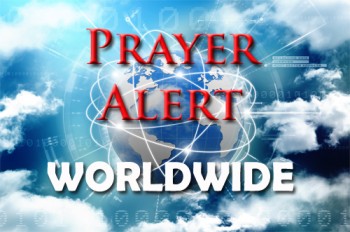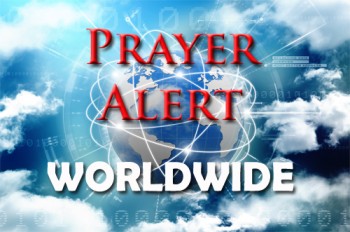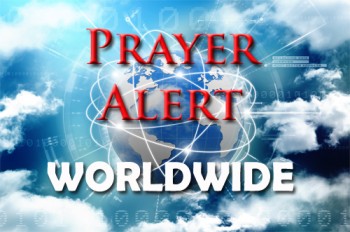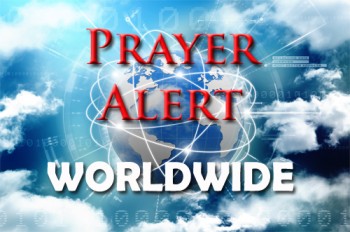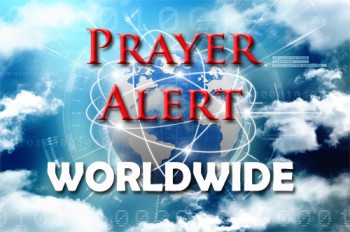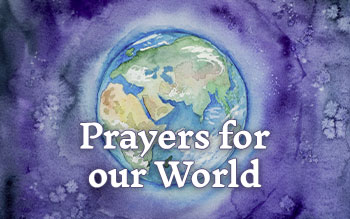Displaying items by tag: Africa
Algeria: punished for worshipping at home
Prosecutors sought a six-month prison sentence and a huge fine for a 35-year-old father in the coastal town of Mostaganem because he invited a Christian couple to come and pray with him in his home. The judge instead awarded a two-month suspended prison sentence and a small fine to the new Christian, who requested anonymity as he fears for his life in the officially Muslim country. He was accused of organising Christian worship; and the law forbids non-Muslim worship for unregistered churches. Sources said that a neighbour had denounced him; he is frightened and shocked by this accusation. Algeria is ranked 22nd on the World Watch List of the countries where it is most difficult to be a Christian, up from 42nd last year.
Tunisia: bombs target security forces
Two explosions rocked Tunis on 27 June, targeting security positions. One blast struck a security vehicle in a busy area of the capital, while the second targeted a police building. A number of police personnel and three civilians were killed. Tunisia has been battling militant groups operating in remote areas near the border with Algeria since an uprising overthrew autocratic leader Zine Abidine Ben Ali in 2011. Since the revolution, dozens of the security forces and 59 foreign tourists have been killed. After an IS-claimed suicide bombing killed twelve presidential guards in 2015, Tunisia has been under a state of emergency. Tunisians made up a large component of the foreign fighters in IS, while the porous border with neighbouring Libya has also aided militants. Spiritually Tunisians are being exposed to the truth of the gospel as they interact with believers on social media sites and search Christian websites.
Uganda: Ebola in frightening phase
The Ebola outbreak in the Democratic Republic of Congo made the long-feared jump across borders with three cases confirmed in Uganda, including the death of a five-year-old boy. Concern has been mounting that this would happen, underscored by an increase in the number of cases in recent weeks. The World Health Organisation and Ugandan health authorities said the Congolese boy had travelled to Uganda with his family. The other two confirmed cases are the boy's three-year-old brother and his grandmother, 50. They are in isolation at a Ugandan Ebola treatment unit. Eight people who had been in contact with the family are being traced. The Congo outbreak is the second largest and second deadliest in history. The Wellcome Trust said, ’This epidemic is in a truly frightening phase and shows no sign of stopping any time soon.’ WHO is expected to come under pressure to declare an international health emergency.
Niger: Boko Haram violence against Christians
Boko Haram warned Christians, ‘You have three days to go or you will be killed!’ So rural families fled to Diffa city. Islamist militias have killed dozens and displaced thousands in the Diffa region of Niger, according to UN officials. There are an estimated 200,000 displaced people in Niger: those displaced internally, and also many who are fleeing the Boko Haram insurgency in Nigeria. Niger’s church ministers working close to zones of conflict are now taking refuge with other Christians in the relative safety of Niamey, the capital. This means that no minister now lives in the premises of the church in these dangerous areas. An observer said, ‘I do not know how the services take place every Sunday, but the churches are not closed’. Earlier this month the governor of the Diffa region ordered churches to close due to the threat of terrorist attacks.
Sudan: risk of further massacres
Last week Sudanese protesters were subjected to brutal military crackdowns, increasing concern about the future. Amnesty International reported that government forces continue to commit war crimes in the Darfur region, and blames the Rapid Support Forces (called Janjaweed by pro-democracy campaigners). The UN and African Union will soon decide whether to withdraw thousands of international peacekeepers from Darfur, leaving tens of thousands of civilians vulnerable to further attacks by Janjaweed. Tibor Nagy, the US assistant secretary for Africa, is calling for attacks against civilians to stop and for talks between the two sides to resume. He will also meet the Ethiopian prime minister, who has been trying to mediate between the military council and the opposition. Last week you prayed for an end to criminal acts of violence and for a negotiated peaceful solution. Please also pray for international engagement with Sudan to prevent widespread identity-based violence against ethnic, religious, political and other at-risk populations. See
Nigeria: Christian persecution growing
Mrs Adeleye and her stepson, Destiny Paul, were driving home from church on 9 June when Fulani herdsmen blocked the road with cows. She tried to turn their car and escape but they attacked, damaged her car, and abducted them both the boy. They later demanded N10 million ransom from her husband. The police said they had swung into action, and would soon get the victims free, unhurt. Attacks on Christians in Nigeria are growing in ferocity and frequency according to Father John Bakeni, a priest who works with survivors of extremist violence. He said, ’The ongoing conflict with Boko Haram and attacks by predominantly Islamist Fulani shepherds have instilled great uncertainty and fear in us Nigerians. We consider each day we live in safety a blessing, because we do not know what will happen the next day.’ He added, ‘It is very difficult to be a Christian in this part of the world, but our faith encourages us to bear witness to the Gospel bravely.’ See
Sudan: Bloody attack on protesters
Tens of thousands of protesters had camped outside Khartoum’s military headquarters since 6 April as protesters and military officials negotiated a transitional government. Protesters want ‘limited military involvement’ in civilian rule. The ruling generals refused to relinquish power. On 3 May negotiating stopped and security forces attacked the sit-in camp, shooting randomly as people ran for their lives. The military blocked all roads, hundreds were arrested and tents at the sit-in were set on fire. A doctors' committee reported on 4 June, ‘40 bodies were pulled from the Nile River and the number of those killed was at least 108’ but warned ‘it was likely to rise; more than 500 were wounded’. Pro-democracy protesters vowed to keep up their campaign, calling for total civil disobedience to paralyse public life across the country. Many analysts believe the military rulers are influenced by powers outside Sudan(Egypt and Abu Dhabi). The bloody assault risks an escalation..
Global: Mercy Ships in partnership with UCB
Sadly, two out of every three people worldwide can’t get safe, affordable, timely surgery. Most of these people live in sub-Saharan Africa – people like mother and daughter, Valerie and Edith. Valerie lived with an enormous tumour on her face for nearly 20 years, but her heart didn’t break until she saw a similar lump growing on her daughter Edith’s face. To watch their story click the ‘More’ link. Mercy Ships believes everyone deserves access to safe, affordable medical care. They use the world’s largest charity hospital ship to deliver free, safe medical care to some of the world’s poorest people. They also train local doctors and medical professionals, enabling them to make an impact that endures long after their ship departs. Mercy Ships has helped the lame walk and the blind see, sharing God’s love and healing all around the world.
Algeria: Christian persecution escalates this year
Windows International Network reported, ‘Christian churches are locked down, Believers are threatened and beaten, homes are invaded, Bibles are confiscated and destroyed, pastors are imprisoned’ and ‘the Muslim persecution of Christian Believers has drastically increased since 2017.’ Algeria is a former French colony, and the French government is so disturbed by this new intolerance that the French parliament has officially opened an inquiry into persecution of Christians in Algeria which has risen to number 22 on the 2019 Open Doors World Watch List of the worst persecutors of Christians in the world. Pray for Christian believers as they face increased persecution and the pastors who are imprisoned to be sustained by the Holy Spirit. Pray also for Muslim-background Christians to be strengthened in their witness to family and friends.
Burkina Faso: 6 killed for following Jesus
THEY REFUSED TO DENOUNCE JESUS — PASTOR, 5 OTHERS SHOT AFTER CHURCH SERVICE IN BURKINA FASO
Last Sunday seemed like any Sunday for 80-year-old Pastor Pierre OuIt, who has spent 40 years serving his church and Sirgadji village community in the northeastern Soum province of Burkina Faso. On April 28, he gathered for worship with his congregation in the West African country. And like every Sunday, he preached the Word of God with the wisdom that seasoned years of life and ministry bring.
But shortly after the service, an ordinary Sunday suddenly turned deadly and a church building where worshippers had just gathered became a crime scene.
KILLED FOR FOLLOWING JESUS
At about 1 pm, while Pastor Pierre was still talking with several congregants in the churchyard, a dozen men on motorbikes stormed the area.
A local leader who wished to remain anonymous told World Watch Monitor: “The assailants asked the Christians to convert to Islam, but the pastor and the others refused.”
Reportedly, the attackers gathered Pastor Pierre and the five other congregants under a tree and then confiscated their Bibles and cell phones.
“Then they called them, one after the other, behind the church building where they shot them dead,” the leader said.
In addition to Pastor Pierre, the attackers killed his son, Wend-Kuni, and his brother-in-law (a church deacon), Zoéyandé Sawadogo, as well as believers Sayouba and Arouna Sawadogo, and a primary school teacher, Elie Boena. Another was seriously injured and taken to a nearby hospital.
The men then set the church building and two motorbikes on fire. Before they left, they stole sheep and a bag of rice from Pastor Pierre’s home.
He and his five congregants were buried the same day in a ceremony that drew people from both Christian and Muslim communities. The pastor leaves behind his wife and six other children.
Other locals reported that the next day, the same attackers (some of them known to village residents as “young men who’ve been radicalized”) came back into the village “searching for Christians.”
The sources say the armed groups can move with impunity because of the lack of law enforcement in the area in the West African country.
“I WOULD RATHER DIE THAN LEAVE”
Previously, Pastor Pierre told relatives about his concerns over the deterioration of security in the region, though there had been no incidents in his village.
The community leader said that when he and others advised the pastor to leave the area, he refused, saying he “would rather die for his faith than leave the community he has been serving for 40 years.”
In the last few months, more than 100 Christians have fled the area, moving farther south, more than 46 miles away. In February, armed men believed to be Islamist militants killed a church leader in the southeast region of Nohao, as he was returning from Togo.
Last Sunday’s violence in Burkina Faso that took the life of Pastor Pierre and his five congregants appears to have been the first attack, specifically on a church building, in which believers in Burkina Faso have been killed by Islamist extremists.
Pray: for the families of the martyrs, that they will have the grace to forgive the attackers.
Pray: for protection of Christians facing persecution daily, around the world.
Pray: for the attackers to be brought to justice.
May 7, 2019 by Lindy Lowry
